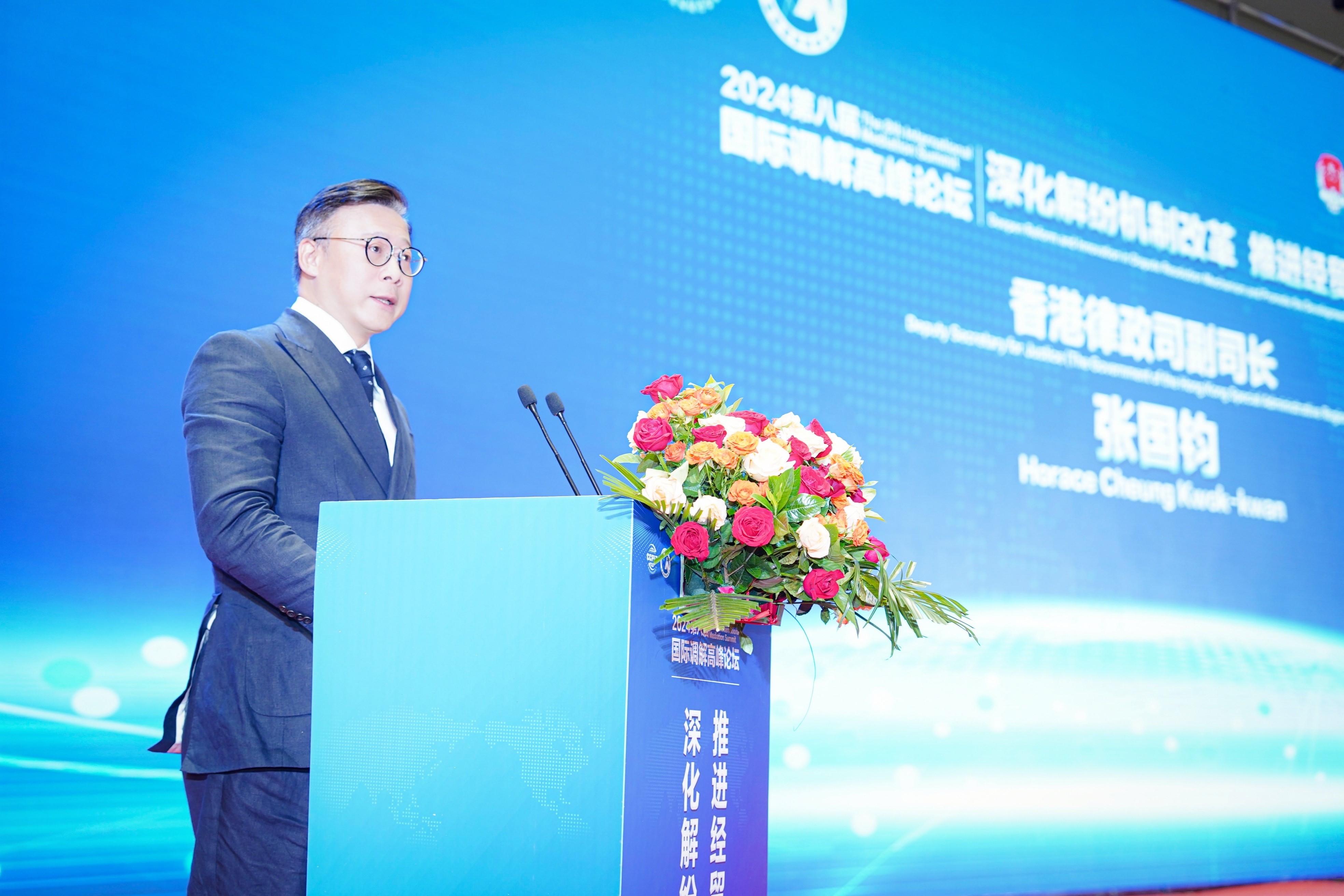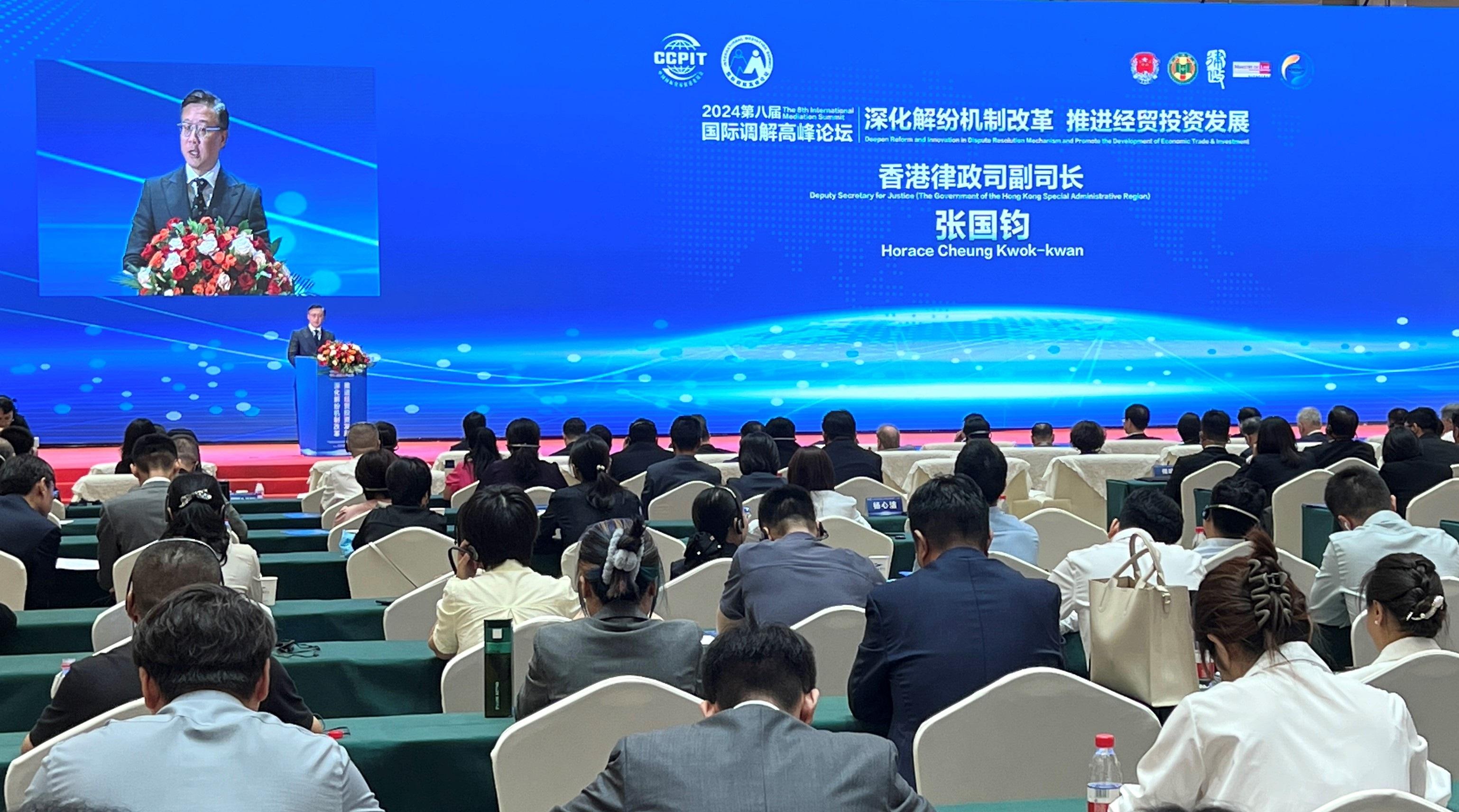Following are the opening remarks by the Deputy Secretary for Justice, Mr Cheung Kwok-kwan, at the 8th International Mediation Summit today (August 22):
Vice Director Mr Tohti Yakov (Vice Director of the Standing Committee of the National People's Congress, Xinjiang Uygur Autonomous Region), Vice Chairman Mr Yu Jianlong (Vice Chairman of the China Council for the Promotion of International Trade (CCPIT)), distinguished guests, ladies and gentlemen,
Good morning. It is with great pleasure and honour to speak again at the International Mediation Summit and gather here today in Urumqi, such a vibrant city of Xinjiang. Not only is the Urumqi city embraced with the warm hospitality and rich culture, it is also a key hub with remarkable economic growth and a strategic gateway to the Belt and Road Initiative. At the forefront of opening-up, there are boundless development opportunities and many important events have chosen to take place here. This is my indeed third visit to Urumqi this year. In January this year, I led a Hong Kong delegation to participate in a forum on China-Uzbekistan co-operation held here. Two months ago in June, I also attended the 8th China-Eurasia Expo in Urumqi on behalf of the Hong Kong Special Administrative Region Government to foster mutual co-operation and closer ties.
This time, with great excitement, I am thrilled to join the International Mediation Summit, which is the largest and the highest profile forum on mediation in China. This summit provides an instrumental platform for enhancing international co-operation and communication in the field of mediation, which is a pillar of dispute resolution that is essential for fostering a thriving business environment.
The theme of this year is "Deepen Reform and Innovation in Dispute Resolution Mechanism and Promote the Development of Economic Trade and Investment". It could not be more timely or important. Urumqi has been playing a crucial role in fostering international trade relationships and facilitating economic exchange between China and other Belt and Road countries. To support the sustainable economic growth in the region and beyond, Hong Kong, as the leading international legal and dispute resolution hub, remains steadfastly committed to promote the use of mediation and driving innovation in this regard.
Being the only common law jurisdiction in China, Hong Kong has unique strengths under "one country, two systems", enjoying the strong support of the motherland and being closely connected to the world. Hong Kong's strong legal foundation and institutional advantages facilitate international investment and trade. Particularly in dispute resolution, Hong Kong is dedicated to promoting the use of mediation in disputes, in order to foster a favourable business and investment environment.
International Organization for Mediation (IOMed)
From an international perspective, with the staunch support from the Central Government, Hong Kong has been chosen to host the headquarters for the International Organization for Mediation, further consolidating our city's role as an international hub for dispute resolution in the Asia-Pacific region. Once established, the IOMed will be an international intergovernmental organisation that provides friendly, flexible, economical, and efficient mediation services for international disputes. This demonstrates the growing global appreciation for the power of mediation in resolving complex conflicts.
Investment Law and Investor-State Mediator Training
The Belt and Road Initiative has strengthened connectivity and promoted international trade between China and the countries along the routes. Xinjiang, without doubt, has been an important corridor to Central Asia, the Middle East and Europe. In view of the upsurge of investor-state disputes arising from multilateral trade opportunities, we see the need of capacity building for investor-state mediation for resolving disputes efficiently.
Since 2018, the Department of Justice (DoJ) has co-organised bespoke training programmes on the Investment Law and Investor-State Mediator for mediation practitioners and government officials around the globe. So far, over 270 participants from 40 different jurisdictions have completed the training. Through the training course, we would continue nurturing talents on investment mediation, and impressing upon governments the benefits of using mediation in resolving investment disputes.
Greater Bay Area
Hong Kong is also at the heart of the Greater Bay Area (GBA), and we have been actively exploring to capitalise on our distinctive potentials and complement the national development. To promote the wider use of mediation in the GBA, the joint conference of the legal departments of Guangdong, Hong Kong and Macao has endorsed mediator accreditation standards, code of conduct best practices and cross-boundary dispute mediation model rules.
The three places have respectively formulated a set of local accreditation rules and will target to establish a joint panel of GBA mediators within this year, ending up with a standardised and highly professional mediation services in the region.
Deepening the mediation culture
Our efforts do not stop here. We are also committed to deepening the mediation culture within our local communities and expanding its reach onto the global level. We thrive to cultivate an environment where mediation is embraced as a preferred method for resolving disputes.
It is our vision that mediation can be used to effectively resolve conflicts in various sectors of the community. We implement measures to empower the general public with the ability to apply mediation and mediation skills in resolving disputes in the community, including disputes relating to neighbourhood, building management, consumers and social welfare, etc, through organising mediation events.
Since 2009, the DoJ has promoted the "Mediate First" pledge among individuals, companies, and organisations from various sectors. At present, we are happy to note that over 890 companies, organisations and individuals have signed this non-legally binding statement of commitment to explore mediation as the primary mean of dispute resolution.
With the mediation culture gaining traction in Hong Kong, we spare no efforts in promoting the "Mediate First" Pledge event outside of Hong Kong, and so far have introduced this event in Shanghai, Qianhai, Shenzhen, and Bangkok. Going forward, the DoJ will endeavour to further promote this brand in the GBA cities and overseas, encouraging greater use of mediation and unleashing the power of mediation worldwide.
Conclusion
Last but not least, I would like to express my gratitude to the CCPIT for organising this summit. I am confident that the discussions and insights shared at this summit will pave the way for greater co-operation, innovation, and synergy in the field of mediation. Let us seize this opportunity to leverage collective expertise, forge meaningful partnerships, and chart a course towards a more harmonious and prosperous future. Thank you.
Follow this news feed: East Asia







